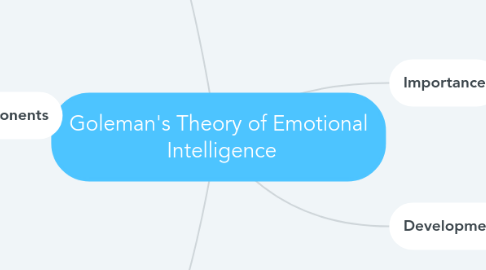Goleman's Theory of Emotional Intelligence
por Stakeholder Map


1. Definition
1.1. Understanding and managing own emotions
1.2. Understanding and influencing others' emotions
2. Five Components
2.1. Self-Awareness
2.1.1. Emotional awareness
2.1.2. Accurate self-assessment
2.1.3. Self-confidence
2.2. Self-Regulation
2.2.1. Self-control
2.2.2. Trustworthiness
2.2.3. Consciousness
2.2.4. Adaptability
2.2.5. Innovation
2.3. Motivation
2.3.1. Achievement drive
2.3.2. Commitment
2.3.3. Initiative
2.3.4. Optimism
2.4. Empathy
2.4.1. Understanding others
2.4.2. Developing others
2.4.3. Service orientation
2.4.4. Leveraging diversity
2.4.5. Political awareness
2.5. Social Skills
2.5.1. Influencing
2.5.2. Leadership
2.5.3. Communication
2.5.4. Managing conflict
2.5.5. Building bonds
3. Criticism and Debate
3.1. Lack of valid tests
3.2. Correlation with conventional intelligence
3.3. Overemphasis on business performance
4. Importance
4.1. Personal Development
4.1.1. Improved self-awareness
4.1.2. Enhanced self-regulation
4.1.3. Motivation
4.2. Professional Development
4.2.1. Collaborative Work
4.2.1.1. Effective Communication
4.2.1.2. Conflict Resolution
4.2.2. Leadership
4.2.2.1. Empathy
4.2.2.2. Influencing others
